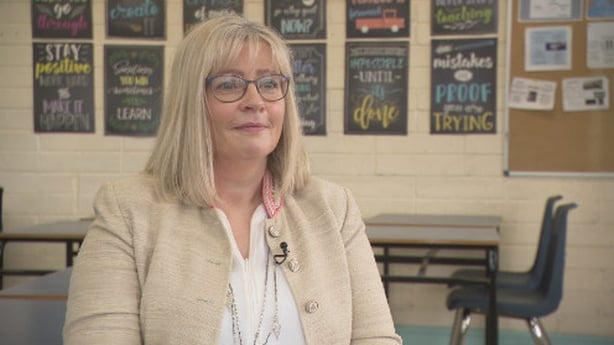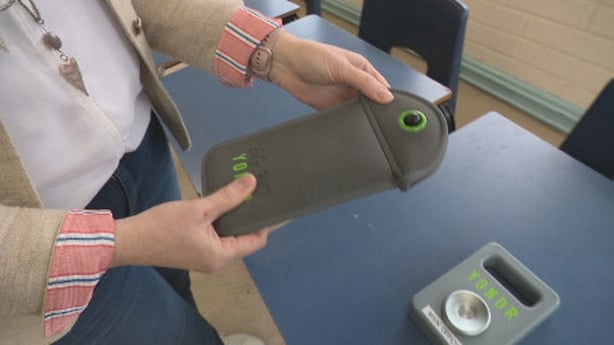The deputy principal at a Dublin secondary school has said that she has had to deal with cases of teachers being cyberbullied as a new survey suggests almost one-in-five secondary teachers have experienced some form of work-related cyberbullying.
The research by Red C, carried out on behalf of the Association of Secondary Teachers, Ireland (ASTI), shows that the most common form of abuse is receiving angry, rude and vulgar messages or having such messages being posted online.
Other forms of cyberbullying reported included videos of teachers being uploaded without their consent; trolling - harmful, untrue or cruel comments being posted online - fake websites or profiles; accounts being hacked and private information being posted about teachers.
Jean-Marie Ward, Deputy Principal at Malahide Community School in Dublin, said: "It does happen and it is not new.
"Teachers feel vulnerable and a bit powerless because you don't know where it has come from."
"It has probably become easier now that phones have become more sophisticated but it has been happening for as long as there has been technology and the internet.
"It's generally students from the younger years, they might record something without people's consent, maybe audio, or take a photograph from the internet and make a meme which is then posted and shared and shared.
"They are anonymous, which makes it very difficult to deal with. Teachers feel vulnerable and a bit powerless because you don't know where it has come from.
"It's really hurtful and it can be really damaging for people."
At Malahide Community School, students have to keep their phones in sealed pouches during the day which has helped to cut down on cyberbullying incidents involving both pupils and teachers.
"The pouches mean the students don't have access to the phone during the day," Ms Ward said.
"It has brought piece-of-mind to our staff because they are not worried about being recorded and it has brought back engagement between the students and made them more sociable."

According to the survey, the majority of work-related cyberbullying is perpetrated by students, but parents accounted for 20% of incidents.
One-in-nine of those subjected to cyberbullying said it was an ongoing problem and for three-in-ten, it has happened more than once.
"Teachers described their experience of cyberbullying as impacting on their self-confidence, undermining their sense of self-efficacy and leading them to doubt their sense of authority in the classroom," said ASTI President Geraldine O'Brien.
"We must protect school communities from this scourge, with strong school policies, strong legislation and increased accountability for social media platform providers," Ms O’Brien said.
The research - 'Digital Technology and its Impact on Teachers’ Working Lives' - is based on a survey of 1,920 ASTI members including classroom teachers, principals and deputy principals.
The study shows that teachers' response to artificial intelligence in education is both curious and cautious.
Some 22% said they use AI in their classroom and almost a third use it in their planning and preparation work.
However, more than 80% have concerns including data harvesting, the potential of AI to undermine professional teacher autonomy and increased teacher workload.

Speaking to RTÉ's News at One, Ms O'Brien said the use of AI by teachers was welcome as they would always engage with the latest initiatives.
She said that while students were free to use it under guidance, credit should not be given to a student who hands in a project that they did not create themselves and was generated by AI.
She said there were "serious concerns" about AI.
"There are advantages but there are limitations," Ms O'Brien said.
"We note that the minister turned back on her decision in relation to the assessment because of AI, not because of the implications of AI but who can adjudicate on it, whether it is it the students own work, or has it been done been done AI or by chat GPT?"
We need your consent to load this rte-player contentWe use rte-player to manage extra content that can set cookies on your device and collect data about your activity. Please review their details and accept them to load the content.Manage Preferences
More than half of teachers surveyed said they receive communications from school management outside of normal work hours at least once a week, while 19% said they receive such contacts on a daily basis.
Four-in-five teachers surveyed said they receive emails from students outside working hours and almost half said they receive emails from parents outside working hours.
The study shows that overall, second-level teachers are enthusiastic users of technology in education, but are challenged by a lack of basic resources in schools, including access to computers and technical support.
Teachers expressed concern about a digital divide amongst students, with teachers in DEIS schools highlighting students' lack of access to digital devices at home as having a negative impact on their ability to engage in important school work.






